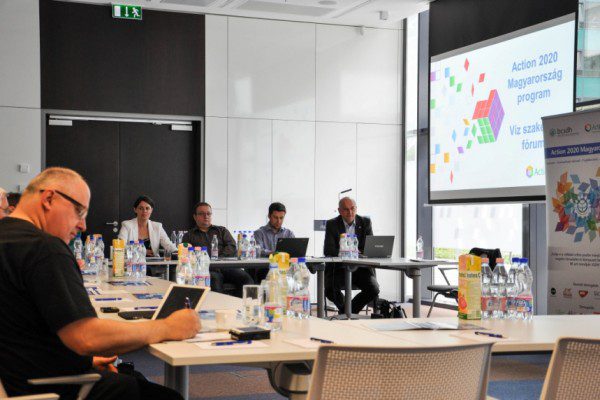In May 2015 a new chapter of the Action 2020 Hungary program kicked off with serious intellectual energy within the walls of program sponsor KPMG. The Business Council for Sustainable Development in Hungary (BCSDH) introduced its major sustainability program which calls the Hungarian business sector to action. After having identified the goals it is now time for companies to contribute to implementation by making commitments and identifying business solutions.
In five groups of experts more than 60 representatives from the civil, scientific and business sector discussed the effect of the measurement indices and started to identify exemplary business solutions.
‘Work based on live discussions between each sphere and immediate feedback ensured the creation of an inspiring and creative framework for the successful fulfilment of the tasks that were undertaken. It would make sense to continue with that kind of directness and method of cooperation. It could also create value for the other working groups of BCSDH’ – explained Attila Chikan Jr., Action 2020 Hungary Working Group Leader and CEO of ALTEO.

During the workshops, the experts tried to identify forward-looking stimulus measures which could be employed to meet all the planned objectives. Mandy Fertetics, Head of Corporate Programs BCSDH, added: ‘The most difficult task is to identify indicators and metrics since we have to take into consideration different business sizes, industries and activities, but we also have to make it possible to summarize the results. In addition, the reference base year, the measurement of changes in units, the investment of the enterprises’ resources (on the input side) and the selection of result and impact indicators also represents a challenge.’

Dr. László Pintér, professor at the Department of Environmental Sciences and Policy at CEU and Senior Fellow and Associate of The International Institute for Sustainable Development (IISD) praised the uniqueness of the consultation process: ‘This Hungarian process is also unique in terms of its international cooperation and the way that the business sector is playing such a proactive and forward-looking role in initiating cooperation with prominent scientific and civil experts to develop national sustainability goals. The participatory process itself creates exemplary and important benefits, not to mention the significance of addressing the upcoming questions: the integration of macro level risks into business, the measurement of effects and the identification of business solutions that go beyond business as usual.’

Exciting issues arose from the discourse at the thematic workshops, including the question of the use of fresh water, the contradiction between the capacity utilisation of fresh water supply and the efficiency of water usage, methodological difficulties with measuring carbon footprints, the need to integrate the concept of the circular economy, the difficulties of assessing ‘fair wages’ and the business solutions concerning non-ownership models of consumption.
The result of this process is a Tool Kit which can help companies to make commitments that can be monitored, in addition to identifying related business solutions or inspiring companies to find their own business solutions. Through this we may inspire even more companies outside BCSDH’s membership circle to contribute with business solutions to serious Hungarian social, environmental and economic challenges.
*****
Action 2020 Hungary:
The Action 2020 Hungary program is the Hungarian adaptation of the global Action 2020 program of the World Business Council for Sustainable Development – WBCSD.
Action 2020 Hungary is a platform for calling the business sector to action and for identifying the most important social, environmental and economic facts, trends and goals.
In contributing to these goals, business solutions are identified and concrete action is taken on the path to sustainable development. Food and Feed, Employment, Sustainable Lifestyles, Climate Change and Water are five focal areas for Hungary where sustainability challenges can be identified on a macroeconomic level that may have great impacts on social and economic welfare and the competitiveness of the business sector.
More than 100 scientific and civil experts and business CEOs actively contributed to defining the goals for Hungary.
Read more: www.action2020.hu



